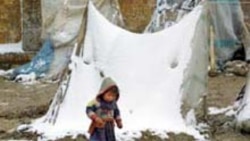However, the 25-year-old says he has put his past firmly behind him. Zainulabuddin lives with his wife and child in the village of Chanjir in southern Helmand Province. He says he is satisfied with his new lifestyle and cannot dream of ever supporting the Taliban again.
Afghanistan's Transitional Administration Chairman Hamid Karzai has said ordinary Afghans who were forced to join the Taliban should not have to stay at home to avoid harassment. But it's not that simple. Former Taliban fighters who have decided to take up civilian life do so quietly. Fearing prosecution and harassment, most of them try to remain silent about their pasts.
While Afghan mujahedin -- factional fighters from anti-Taliban groups -- are offered retraining for civilian jobs under a special UN-sponsored program for disarmament, demilitarization, and rehabilitation, former members of the Taliban have no such support network and must fend for themselves.
Mullah Mohammad Khaksar served as deputy interior minister for the ousted Taliban regime. He says former Taliban fighters who have given up their weapons and renounced militia activities should be distinguished from those who continue to fight against the transitional government.
"No one knows what percent of Taliban fighters have returned to [civilian life]. However, according to people and my own estimates, I would say some 50 percent of the former Taliban have come back home and taken up civilian life. They are confident that no one will bother them. This optimism and their return is a result of the amnesty given by Afghanistan's transitional president," Khaksar said.
Remnants of the Taliban continue to oppose Afghanistan's transitional government and the presence of coalition forces in the country.
On 10 February, the region around the southeastern city of Khost was hit by rocket attacks. At least two Afghans were reported killed in an explosion at a government military post. The blast was blamed on Taliban operatives. Two days earlier, a suspected Taliban militant killed the region's deputy intelligence director.
Nematullah, a Kandahar resident, says people condemn the Taliban's frequent attacks.
"There was relative peace during the Taliban times, but people did not have personal freedom. People were not able to live freely. They were under strict control. But people are free now. Kandahar has relative security. There is not a major [security] problem. Some small incidents and blasts occur, but these incidents are normal when a new government comes. Well, there are still some people who oppose [the government], and they are responsible for such attacks, but people condemn these attacks," Nematullah said.
Ahmadullah, a fellow resident of Kandahar, agrees.
"People do not support the Taliban because they don't have good memories from Taliban leaders or the rest of the group. If Kandahar residents find out that a group of former Taliban fighters is based somewhere, I think 98 percent of people would help to detain the Taliban and hand them over to authorities," Ahmadullah said.
Recently, some tribes in Afghanistan's southern regions -- including the large and influential Zadran tribe -- decided that if any member of their tribe is found to be supporting the Taliban, his house will be set on fire and he will be expelled from his village.
RFE/RL's Afghan Service contributed to this report.









